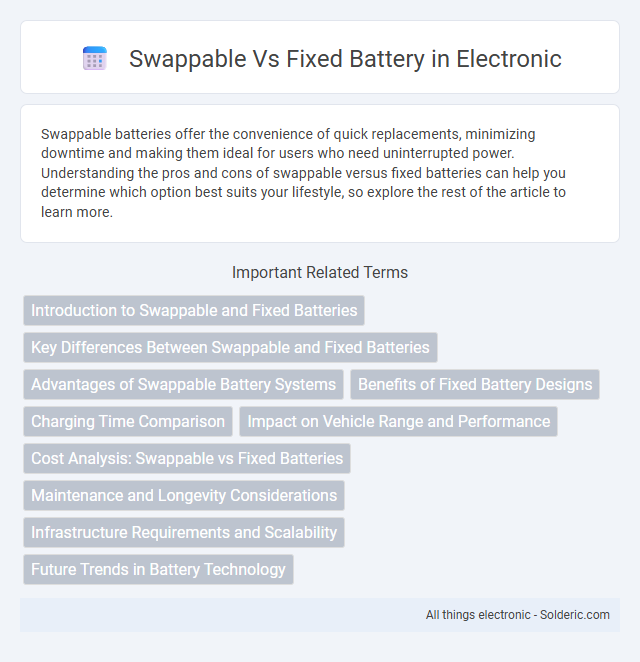Swappable batteries offer the convenience of quick replacements, minimizing downtime and making them ideal for users who need uninterrupted power. Understanding the pros and cons of swappable versus fixed batteries can help you determine which option best suits your lifestyle, so explore the rest of the article to learn more.
Comparison Table
| Feature | Swappable Battery | Fixed Battery |
|---|---|---|
| Definition | Battery can be removed and replaced easily by the user. | Battery is built-in and non-removable by the user. |
| Replacement | Quick replacement extends device usage without downtime. | Replacement requires professional service or sending to manufacturer. |
| Device Design | Typically thicker, with accessible battery compartment. | Allows slimmer, more compact device design. |
| Battery Life Management | User can swap with fully charged batteries, enhancing uptime. | Battery charging and health managed internally, no user swap. |
| Durability | More connectors may increase failure points. | Sealed design improves water/dust resistance and durability. |
| Cost | Potentially higher initial cost due to modular design. | Often lower initial cost but higher replacement service cost. |
| Use Cases | Ideal for heavy users needing extended battery life (e.g., field work). | Suitable for everyday users valuing sleek design and reliability. |
Introduction to Swappable and Fixed Batteries
Swappable batteries allow you to quickly replace depleted power packs with fully charged ones, ensuring minimal downtime for your device or vehicle. Fixed batteries are integrated into the device, offering a compact design but requiring longer charging periods and professional service for replacement. Choosing between swappable and fixed batteries depends on your need for convenience, continuous operation, and device design preferences.
Key Differences Between Swappable and Fixed Batteries
Swappable batteries offer the convenience of quick replacement and extended device usage through portable power packs, while fixed batteries provide a more compact design with integrated power storage. Swappable battery systems typically enable longer operational time by allowing users to carry and exchange multiple charged batteries, contrasting with fixed batteries that require device downtime for recharging. The trade-offs include increased device weight and complexity in swappable models versus improved durability and reduced maintenance in devices with fixed batteries.
Advantages of Swappable Battery Systems
Swappable battery systems offer rapid energy replenishment by enabling users to replace depleted batteries with fully charged ones in minutes, significantly reducing downtime compared to fixed battery setups. These systems enhance operational efficiency in electric vehicles and devices by allowing continuous use without the need for lengthy charging sessions. Furthermore, swappable batteries facilitate battery lifecycle management and upgrade flexibility, promoting sustainability and cost savings through modular replacements and extended battery usability.
Benefits of Fixed Battery Designs
Fixed battery designs offer superior structural integrity and enhanced device durability, as the battery is securely integrated into the device chassis. These designs allow for slimmer, more compact electronics by eliminating the space required for removable battery mechanisms. Your device also benefits from better water and dust resistance due to fewer entry points, ensuring longer-lasting performance in various environments.
Charging Time Comparison
Swappable batteries offer significantly reduced downtime by allowing you to replace a depleted battery with a fully charged one in minutes, avoiding lengthy charging sessions. Fixed batteries typically require several hours to recharge fully, limiting continuous use during long trips or heavy usage. Choosing a swappable battery system enhances convenience and efficiency, especially for users needing quick turnaround times.
Impact on Vehicle Range and Performance
Swappable batteries significantly extend vehicle range by allowing quick exchange with fully charged units, minimizing downtime and enabling continuous operation. Fixed batteries generally offer higher energy density and structural rigidity, enhancing overall vehicle performance and stability but limiting range to the onboard battery capacity. The choice between swappable and fixed batteries impacts range flexibility versus performance optimization, influencing design and usage strategies in electric vehicles.
Cost Analysis: Swappable vs Fixed Batteries
Swappable batteries typically incur higher initial costs due to the advanced engineering and infrastructure required for quick removal and replacement systems, while fixed batteries tend to be less expensive upfront but may lead to higher long-term maintenance expenses. Your overall cost analysis should consider the operational advantages of swappable batteries, such as reduced downtime and extended vehicle usage, which can offset their premium price over time. Fixed battery designs often benefit from simpler manufacturing and integration, resulting in lower initial investment but possible future expenses related to battery degradation and replacement challenges.
Maintenance and Longevity Considerations
Swappable batteries offer easier maintenance by allowing users to replace depleted units instantly, reducing downtime and extending the overall lifespan of the device through modular use. Fixed batteries, integrated into the device, often require professional servicing for replacement, which can be costly and may shorten the device's usability if not properly maintained. Longevity in swappable systems benefits from distributed wear across multiple batteries, while fixed batteries depend heavily on the build quality and effective thermal management to prevent early degradation.
Infrastructure Requirements and Scalability
Swappable batteries require extensive infrastructure including charging stations and storage units to ensure immediate availability, impacting scalability in urban areas. Fixed batteries depend on integrated charging solutions often limited by vehicle downtime, making expansion easier but slower. Your choice influences the investment needed for infrastructure development and how quickly the system can grow and adapt to demand.
Future Trends in Battery Technology
Swappable batteries are gaining momentum in electric vehicles (EVs) and portable devices, enabling rapid energy replenishment and extended usage without long charging waits. Fixed batteries, however, benefit from advancements in solid-state technology, offering higher energy density and increased safety within a compact form factor. Future trends suggest a hybrid approach where modular swappable units incorporate solid-state chemistry, balancing convenience with superior performance and longevity.
Swappable vs Fixed battery Infographic

 solderic.com
solderic.com